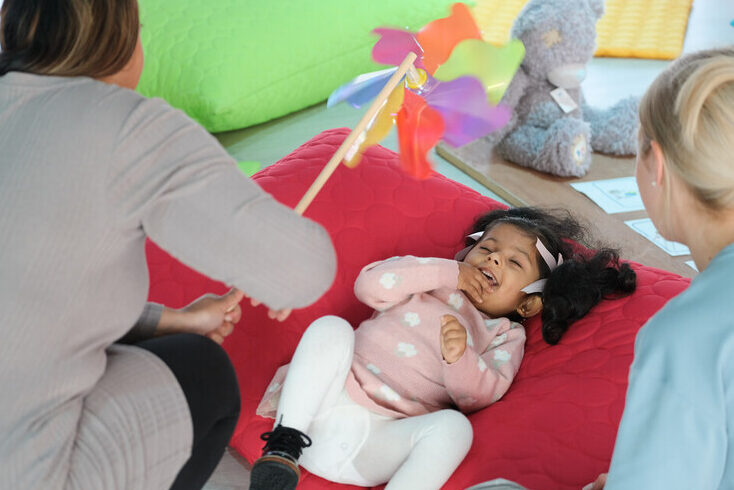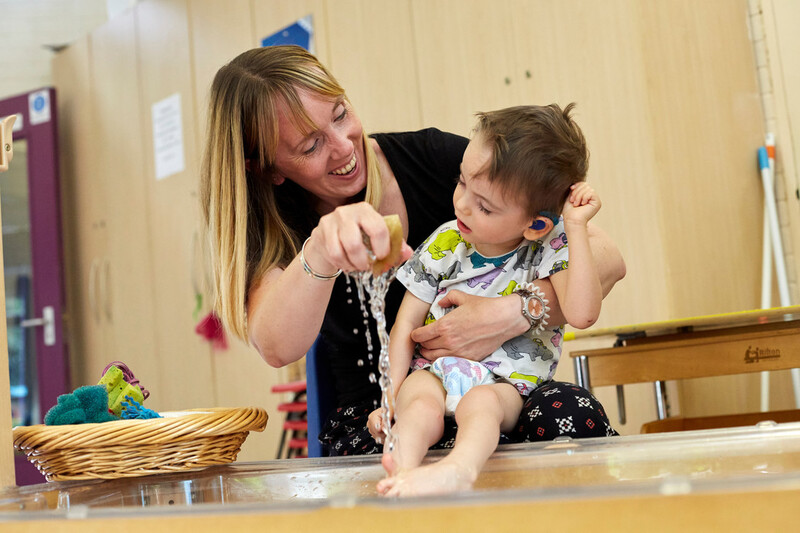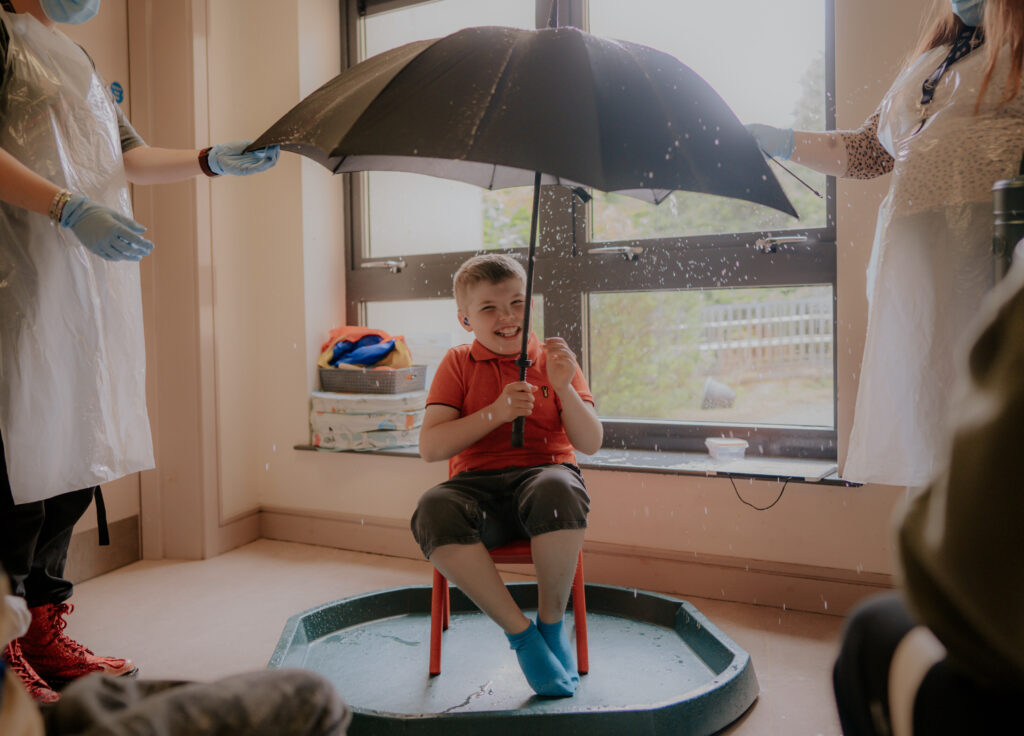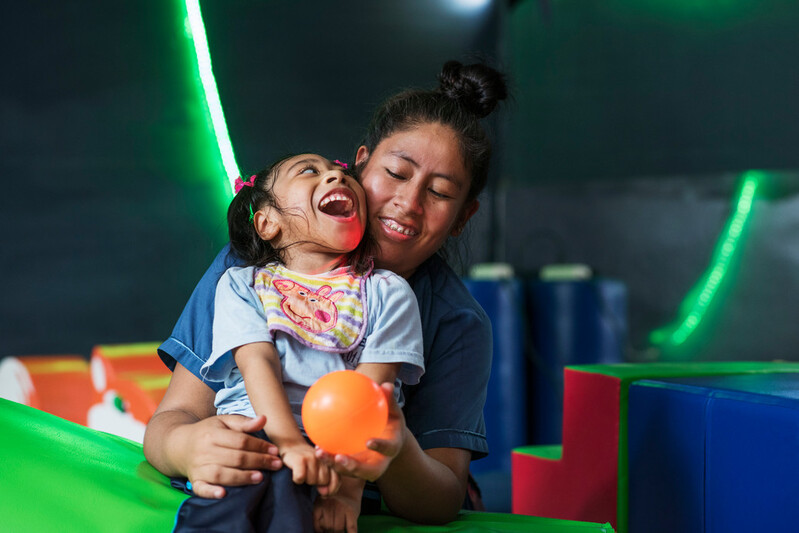How play unlocks the world for disabled children
Playing in childhood is a fundamental part of our development, imparting skills that enable us to live rich, fulfilling lives. From infancy to adulthood, people with complex disabilities gain profound benefits from both structured and independent play. Sense specialists Jade and Laura discuss all that play offers.
Jade: Hi, I’m Jade. I’m based in Wakefield as a specialist teacher at Sense – an MSI Consultant, which means I support young people with Multi-Sensory Impairments. We want to give everyone safe, engaging ways to understand the world around them, and play is an incredible way to do that.
Laura: Play is a massive part of my work with Sense, it’s literally in my title! I’m an Early Intervention and Play Leader, mostly supporting 0–8-year-olds in Birmingham through our Connect and Play sessions. Getting silly, messy and expressive is one of the first ways children start to learn about themselves and their relationship with everything around them.

Jade: There’s absolutely no definition of what play is. Children with MSI or complex disabilities will have a thousand ways of stimulating themselves, playing and communicating – and actually, that means their behaviour can be misinterpreted. Families can miss out on engaging with their child’s play or encouraging their development because they don’t immediately recognise that their child is initiating play.
Laura: Yeah, we see this a lot. Because each child’s communication style is so unique, parents often need support to spot those opportunities for play. Something like 95% of the families Sense support seek our advice on this.
The concept of self and our surroundings
Jade: Children with MSI want to know what’s going on around them, just like all of us. But without sight and hearing, just understanding where they end and the world begins can be really hard to establish.
Laura: This is one of the first things play helps to unlock. Until children know what they can do, what they can experience, they’re less likely to start really exploring their world. With play, we can give children a sense of their full body. Touch, sensory play and massage all encourage children to seek stimulation. Knowing that their hands can tap and squeeze and feel opens up routes to the wider world.

Jade: Definitely. Grasping how we exist in relation to everything around us is key for skills like mobility and orientation. We do things like playing on a resonance board to amplify movement and turn sound into vibration, or we roll an object back and forth within a frame to show how objects don’t just vanish when they move out of our field of reach.
Communication and building relationships
Laura: In that ball rolling exercise Jade mentioned, there’s a lot going on. It’s a way of communicating. I support a girl who loves it when we spin a ball between us. When she spins it to me and I spin it back, I’m understanding and responding to her request.
I’ll do this as many times as she wants because the consistency in my responses is key to showing her that I’ve understood her request. It also builds up trust, she gives me the ball and trusts that I’ll return it.
Jade: A lot of children make leaps forward in their communication during play. There’s real motivation to express a want, to join in or to communicate that they want an activity to end.

We use narration to support communication development, using key words or signs so the children can start to make associations. Having a stream of information during play is also really good for building up children’s awareness of each other.
In group play, for example, we can introduce the idea of how everyone in the group can have different perspectives and experiences. If we’re all doing messy play, I might say, “Oh Laura, I can see you’re really not enjoying this cold sand, are you? Beatrix is loving it though! She’s got both hands in.” It’s an introduction to empathy.
Laura: Creative play is also great for that, like giving dolls characters and experiences too. Then if the doll gets dunked in playdough we can say, “Dolly didn’t like that.” It starts to bring a social element into their understanding of cause and effect.
Confidence through cause and effect
Jade: Learning through cause and effect is a really exciting part of play. It’s how disabled children discover their physical presence in the world around them, and their power to influence it. A simple example is pressing a button to make a sound.
Laura: You can see children’s faces lighting up when they have these experiences. It’s fun but they are also developing cognitive skills and their mobility. Motivation to tap buttons or bang drums encourages children to increase and develop movement with individual limbs and/or movement of their whole body; gradually this play has introduced full body mobility.

Jade: Waiting for the effect of your action is how you begin to anticipate what’s about to happen next. This anticipation means that you’re preparing yourself for that imminent event.
Laura: Routine is so important to people with complex disabilities, with anticipation we can start to thread together a whole daily or weekly routine. Nobody wants things to just happen to them, we all like to know what’s going to happen – and to have some say in it.
Jade: Completely, as far as possible, everything should be a choice. If you know what’s coming next you have more scope to say ‘no’ if it’s not something you want to do. That independence and power to consent are essential life skills.

Learn how to connect and play with your disabled child
Explore our play guide to find lots of fun ideas for activities that children who are deafblind or living with complex disabilities can enjoy playing.
Don’t forget to check out Sense Connect and Play sessions too, if you’re based in Loughborough, Birmingham or North Wales.
If you have a child with complex disabilities and would like support from Sense, please reach out to our friendly team.
